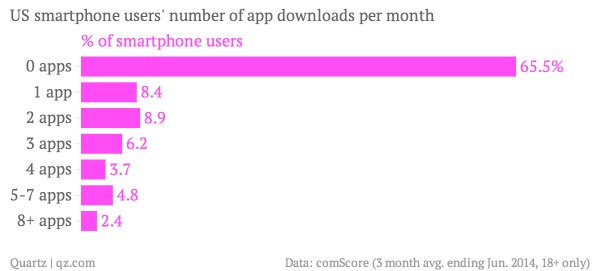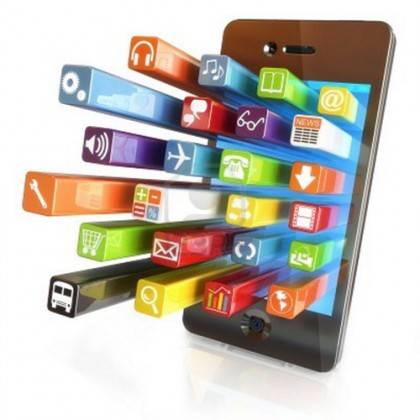
In summer of 2008, Apple introduced another game-changer that would affect the way people used smartphones moving forward – the iPhone App Store. This has now contributed to the global consciousness about apps, and Google saw that this was the only way to go to peddle its apps as well through the Android Market, concluding in the current incarnation of the Google Play Store. But why does comScore’s new data point to a staggering truth – that most smartphone users average ZERO app downloads in a month?
According to the same study, 52 percent – a little over half the time people spend on digital media (Internet, smartphones, tablets) are on apps. Yet the numbers of the report say this – that 65.5% of all smartphone users in the country average zero app downloads in a month. Only one third – roughly 30% — download any apps at all, and that would be around 1 to 3 apps.

What’s the deal? It’s not like these apps aren’t useful – the usage numbers say that more than half of US smartphone owners tapped and used apps on a daily basis (comScore). Are good apps too pricey? We all know that most apps are free, and even then, most paid apps average on from a few cents to a few dollars, and the market is such that it pushes prices down rather than up.
One suitable explanation maybe that over the years, the app saturation has gone on to very high levels that it pushes users to have an “app routine” – that is, get to know the apps that do the job for you, and stick to them like glue. Once a user falls into a routine, they will still have the same apps even if they upgrade devices – the Google Play Store has made this tremendously easy, and even I can say that I am glad for it.

Another explanation may be that the Apple App Store and the Google Play Store – but more Apple than Google, really – has made it very difficult to discover new apps. The Apple App Store ecosystem is notorious for relying heavily on “top lists” and also known for not improving its search functions over the years. This only makes “editor’s picks” and bigger companies get all the profit and pushes an app – however ingenious it is – to the bottom.
The numbers won’t lie, the app ecosystem has pushed people to a state of non-discovery. It falls a lot to Android journalists and writers to discover and recommend the cool apps that need to be unearthed out the pile. But it also points to Apple and Google having to improve their market ecosystems, or else it might die a slow and painful death.
VIA: QZ










I remember my black berry having an app store before the iPhone came out…just sayin
everyone had, Apple just thanks to these facts (mostly in the US):
“Study: iPhone owners have ‘blind loyalty’ and will buy anything Apple makes”
“Overall, consumers purchasing Apple’s iPhone models are the ones doing the least amount of pre-purchase research.” = blind followers again
Well, how many high quality apps are released in any given month? I’ve been an Android user since the G1, and in those halcyon days of yore there was a continuous onslaught of new and exciting apps which added functionality and value to the phone. The landscape was fresh and new.
Now, it’s rare to find an app which can expand the core functionality of the phone because many of those features have been rolled into the OS. Further, apps are much more mature now then they were in the past.
There is little reason for an average person to ever even go to the play store on a monthly basis. I’m certainly an outlier, I probably download 30+ apps a month, the vast majority of which I promptly delete for being “meh,” my parents on the other hand, both who’ve also been on Android since its inception, have zero need or desire to access the play store after the first month or so. By then their phone is completely set up to do everything they need it to.
Looked at another way, how often does the average person purchase software for a PC?
That’s a good point about PC software. I think that’s why we’re starting to see companies switch to subscription models for PC software– take Adobe’s software suite, and Microsoft Office for example. That way, it keeps the money rolling in from people who would normally wait to upgrade their software.
I quite literally have all the apps I can imagine I’ll ever need. I don’t play games on my phone; choosing not to waste precious battery power on nonsense time-wasters.
same here. I don’t like playing games on a touchscreen and I’m afraid I’ll buy something by accident with all the hidden IAPs. I think you’re describing the majority of users. Smartphone app stores are not stimulating enough to warrant ‘browsing’, and too often, apps are junkware anyway.
If you get a good hardware controller, like the moga and but some premium games or use emulators, I think you’ll find that gaming on a phone is pretty darn good.
I already have an Ouya for this :]
even just 30% of people world wide, that’s many millions. it would seem we are just talking about phones here, I’m sure tablets are a different story.
I have a 32gb SD card that’s going to waste and I’m constantly nagged that my internal storage is >75% but I can’t move anything due to the crappy design of either the Android OS or the Sony Experia ZR phone. Sure I can move media (pics, music, etc) but the 4gb internal phone storage is woefully inadequate and the OS won’t allow the movement of apps or even some of the app data which is taking up space. My wife’s 32gb iPhone seems a much better option in the future. No app problem or nagging going on there. So it’s no wonder we’re downloading zero apps due to Android’s screwed-up design. I’m actually deleting apps due to the storage snafu.
That’s why I use Samsung phones (they’ve usually got huge internal memory and sd card support).
there is no snafu in the os’s design. you wouldn’t install a program on windows on an external USB stick. it’s the smartphones that are “woefully inadequate”, as you say. Selling a phone with 4GB storage should be forbidden. there are plenty of android phones with 32gb internal storage and you don’t even have to spend much (nexus 5, lg g2).
Actually I had an old Dopod 818 Pro (aka HTC) “smartphone” running Windows Mobile that gave you the choice to put the “apps” (programs) in internal storage or on the SD card. I assumed incorrectly you could do something similar with the Android OS which is why I wasn’t concerned about the 4gb internal storage. This was my first smartphone since the HTC. Lesson learned… And there is culpability by Google. Quote from one app designer:
“Google have made a change to the Android OS with the release of v4.4 KitKat. It restricts applications from accessing the external SD card. If you have moved your maps to the SD card this will cause Memory-Map app to crash. We are working on a fix, but it is a complex issue that will have to wait until one of the next updates.”
This is why I hate companies for releasing 8gb & 16gb mid to high range phones 32gb minimum with a 64gb option on the high end phones please.
32GB will be much better, or at least 16GB for me + microSD card slot
you should be able to move App to SD?
Most apps I use I don’t even update (as they can be worse than the previous version) but I agree that the app shops are AWFUL for searching or discovering new content. Google Play is, like Google Maps, badly designed and only useful as a destination to arrive at from internet browser search results.